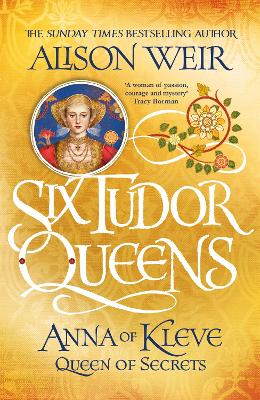Reviewed by Amber (The Literary Phoenix) on
Man, I really wanted to like this book.
First of all, I should start off, I really like Philippa Gregory’s books. I’ve read The Constant Princess three times. I have both a hardcopy and audiobook edition of The Boleyn Inheritance, which includes her take on Anne of Cleves. I am constantly fascinated by the intrigue of the Tudor Court. I love the way it’s a romance, a suspense, and a solidly good drama. But it all depends on the author.
And I’m the worst. I get it. I’m comparing authors and it’s unfair but I need to. Because I adored Anne’s story… but when it was told by another person.
I’ve been told for several years now I need to try something by Alison Weir if I’m a historical fiction fan. I still have a couple of her other books on my TBR. And perhaps it’s because I’m so used to Henry VIII’s wives being told in a different voice, but I was so bored but Anna of Kleve.
Being completely upfront… I blame the writing style. It was detailed to a fault, but it was not detailed in such a way that it felt immersive. Instead, it felt like detail dropping. I love the way Philippa Gregory (I know, I know) takes the story and pulls you in… Alison Weir felt more like a tour guide at a weird museum. Like the Iowa Yarn Museum or something. I don’t think that actually exists.
I’m a bit of a history nerd, so as I was reading, I fact-checked constantly. There were quotes in the book that were exactly replicated in Wikipedia. Perhaps they were the most interesting quotes? Very little is known about Anne, and a lot of what Alison Weir used here felt… indulgent. Almost nothing is known of Anne’s early life, except that she was betrothed at eleven and that betrothal was broken. Where this story starts, Anna is twelve and has been betrothed for as long as she can remember, so already Weir is being casual with the little facts she had. This raises a red flag for me. A well-written historical fiction novel should make you forget it’s fiction. This felt absolutely like sappy fiction.
Another thing that soured me right at the beginning? Less than twenty pages into the novel, Anna is having sex with her cousin, a fourteen year old. She goes on to have a baby, and they are her secret family through the whole Henry affair. There’s no historical claim for this other than Henry doubted her virginity, but everything we know of Henry VIII tells us he was an indulgent, prideful king, and honestly? I trust very little of what he says about his wives. So this whole plot (and really, this was more the plot than any other storyline) never sat well with me.
Understand – there’s no proof this stuff didn’t happen… but it just felt … really unlikely.
Anna is portrayed as very changeable. Paragraph by paragraph she’s either frightful or annoyed or making heart-shaped eyes at either Henry or Otho. The writing always felt flat, as so much of England’s story is told through people coming from court to talk to Anna, followed by her fleeing to her rooms to be upset. The reader is one step removed from the action of the Tudor court at all times. I never felt an emotional connection to Anna because of her personality inconsistencies, and I found myself frustrated within her story of “will anything ever happen”?
There are little details here and there which grate, but are subject to creative license. Anne of Cleves is called Anna of Kleves based on the spellings of the time and a desire to de-anglify. Which is fine, but it’s untraditional in this case, and a bit distracting. Katheryn Howard’s name, too, is normally Catherine Howard. Things like that, which are minor, but enough to make me concerned about historical inaccuracies.
I just… deeply did not enjoy Anna of Kleve: The Princess in the Portrait. I’m not sure if this book is a one-off miss for me, or will end up being indicative of Alison Weir’s style. Because there is so little known about Anne, there’s a lot of creative room. Additionally, having already read a version of this story that I greatly enjoyed, it was difficult not to compare. I’ll keep the other books by Alison Weir on my TBR for now, but my hopes have been sorely dashed. She’s not for me, but others – particularly those with a romantic heart and great patience for monotonous detail – will enjoy this one.
Reading updates
- Started reading
- 12 July, 2019: Finished reading
- 12 July, 2019: Reviewed
